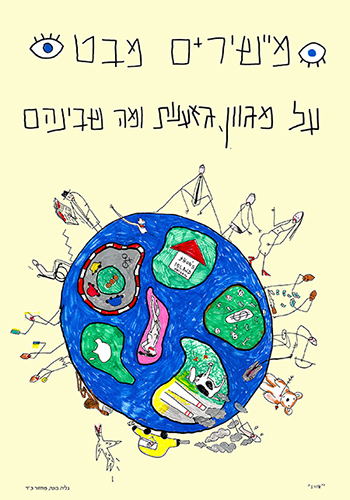
Looking in
to diversity, racism and everything in between
Galia Boneh works in community development, and has spent many years in this capacity in Africa and in the United States. In Malawi she set up and ran a local organization called the Center for Global Art and Health, developing programs to encourage leadership, entrepreneurship, and the use of art to create dialogue about social and cultural issues affecting health. Galia twice received a Fulbright scholarship to teach at the University of Malawi. She holds a bachelor’s degree in performing arts from the University of Ghana (including a year’s internship in Kenya in an international development program run by the University of Minnesota), and a master’s degree and PhD from the Department of World Arts and Cultures at UCLA. Galia is interested in education processes that can lead to the appreciation of human variety as a source of power and cultural wealth.
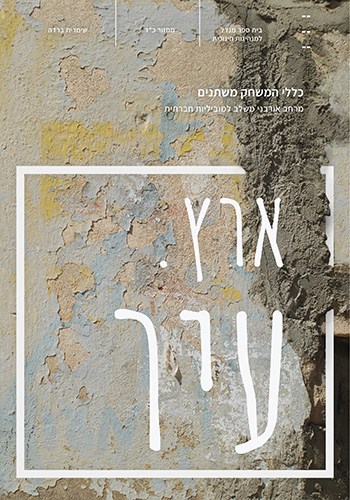
Name a City that Starts with…
The rules of the game are changing - An integrative urban space for social mobility
Shimrit Barda directed the organizational consultancy unit of the Prime Minister’s Office, in which capacity she consulted on strategic processes in the office, and helped senior managers with leadership development and planning. Previously Shimrit worked as a senior organizational consultant in the IDF, and in the private and nonprofit sectors. She holds a bachelor’s degree in sociology and education, and a master’s in organizational studies, from the department of sociology of the Hebrew University of Jerusalem. Her master’s thesis was written on collaborations between academia and industry, and she has since concentrated on integration processes between systems and organizations. Shimrit is interested in policy development, as well as in the connection between different groups in Israeli society, and the fostering of trust and respectful dialogue, based on pluralism and tolerance.
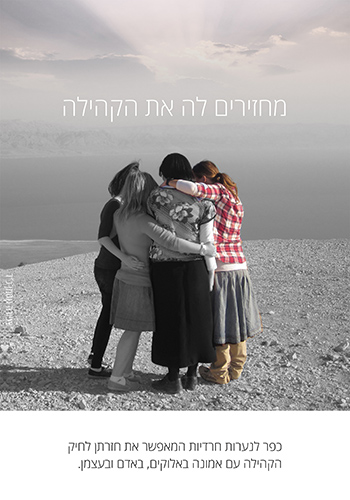
Bringing Her Back
A residential youth village for young Haredi women that allows them to return to their communities with renewed faith in G-d, humanity, and themselves.
Tzipora Gutman is a social activist in the Haredi (ultra-Orthodox) community, and focuses on the development and implementation of services for populations at the more extreme end of the therapeutic continuum. She has lobbied for legislative changes that will help bridge gaps between the Haredi community and the government in the field of treatment and punishment of sexual offenders in Haredi society, working in tandem with rabbis, legal experts, and MKs from different parties in the Knessset. Tzipora founded and directed the Adi Center for at-risk girls in Bnei Brak, an educational and therapeutic framework for girls from Haredi homes who have dropped out of the formal school system. She has also worked on setting up religious seminaries for female high school graduates from the Haredi community. Tzipora holds a bachelor’s degree in psychology from the Open University, and a master’s degree in public policy from the Hebrew University of Jerusalem. She is interested in developing educational and therapeutic frameworks for girls from the Haredi community whose needs are not currently met within the community, such as a youth village for Haredi girls at risk.
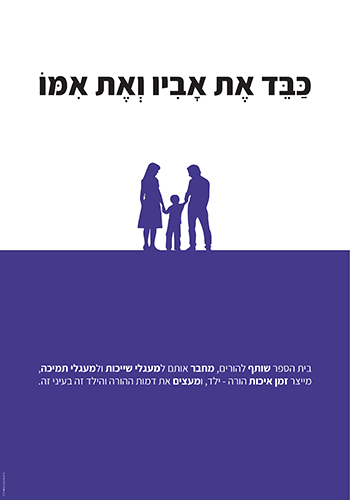
Honor their Father and Mother
A school that partners with parents, connects them to circles of belonging and support, creates parent-child quality time, and strengthening the image of parent and child in the eyes of each other.
Nadav Greenberg is an educator who works mainly in informal educational settings. Most recently he directed the educational residential school of the Aloni Yitzchak youth village, and also lectured in the training course for residential school principals, and tutored in the training course for counselors. The village was awarded the Education Prize for Residential Schools. Nadav also served as a community emissary to Pittsburgh on behalf of the Jewish Agency for Israel. He holds a bachelor’s degree in brain science from Bar-Ilan University, and a master’s in business administration, specializing in nonprofit management, from Haifa University. He is also a graduate of the Israel Tour Guide School. Nadav is interested in parental attitudes to the role of the educator; in the role of the education system in nurturing the relationship between parent and child; in a Jewishly-inspired approach to immigrant integration; and in education towards social awareness and proactivity in shaping a humanist society.
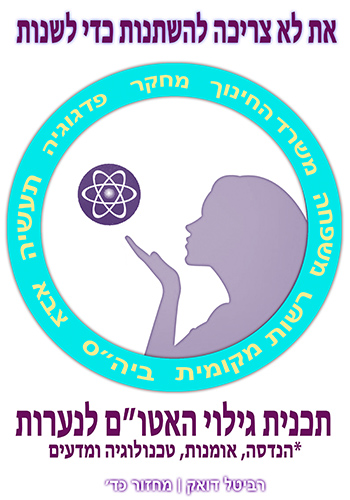
You Don't Have to Change Who You Are to Change the World
Engaging girls in STEAM fields programs
Revital Duek has 20 years of experience in hi-tech companies. She began her career in companies that developed computer-based platforms for learning technology, science, and languages. In a series of senior positions in Israel and in the international market she has directed business divisions, marketing divisions, and sales and business development units. Revital holds a bachelor’s degree in industrial design and management from the Technion, and a master’s in business administration from Bar-Ilan University. She is active in providing tools for young people to cope with the challenges of the internet and of surfing it, and serves in the Technology and Science Forum run by the “New Faces” nonprofit, which aims to introduce girls to scientific and technological professions – a subject she is interested in developing further.
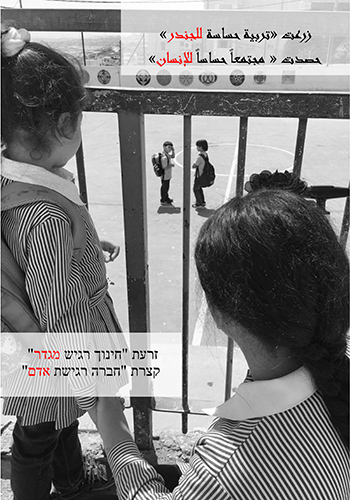
Sow: “Gender-Sensitive Education”
Reap: a “Person-Sensitive Society”
Diana Daaboul is a lecturer and researcher in education and special education. She began her career as a special education teacher, and worked as a pedagogical instructor and lecturer in education and special education at the David Yellin Academic College of Education in Jerusalem, where she served for eight years as head of the track for special education in Arab society. Diana directed the Al-Farah Center supporting children with learning disabilities in private schools in East Jerusalem, and taught at a number of in-service teacher training institutions. She holds a bachelor’s degree, a teaching diploma, and a master’s degree in special education, and a PhD in social work, all from the Hebrew University in Jerusalem. She also holds diplomas in pedagogical academic management and in teaching school principals. She is a social activist, and a committee member at several educational institutions, including the board of directors of the Arab Pedagogical Council. Diana is interested in fostering cooperation between the different sections and streams of the education system.

EQ*
*Emotional Quotient: the measure of status
Ilanit Dror is an educator. She was most recently principal of the Beit Eckstein high school for young people with psychiatric difficulties. The school’s approach is humanist, with a strong emphasis on interpersonal relationships and on developing the pupils’ emotional and social skills. Ilanit has also worked at HaMidrasha at Oranim Academic College, as director of a program for at-risk youth in Israel’s northern periphery, and has run youth leadership development groups – programs aimed at developing young, socially involved leadership in Israel’s geographic and social periphery, and at promoting equal opportunities. In addition, she acts as a personal coach to new school principals. Ilanit holds a bachelor’s degree in the humanities, literature, and language, as well as teaching diplomas for each of those disciplines, and a master’s degree in education system development and management, from the University of Haifa. She is interested in strengthening trust between teachers and parents.
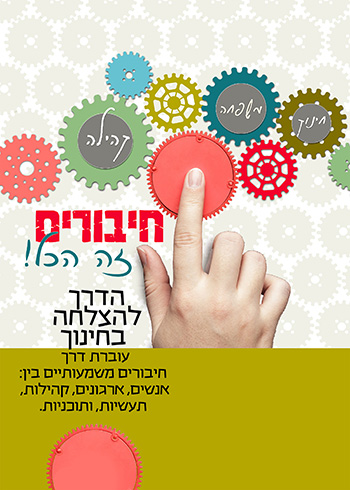
It’s all about Connections!
The path to success in education is built on meaningful connections – between people, organizations, communities, industries, and programs.
Moti Vaknin is an educator and school principal. He served as the middle school principal and high school principal of the Gross Education Campus in Kiryat Gat, which contains religious schools for boys and girls. As part of his role he led collaborations with the major hi-tech companies in Kiryat Gat, such as Intel, opened a cyber study track, and developed cooperation with the Nahal Soreq Nuclear Research Center. During his time as principal the school was awarded a regional excellence prize, the National Education Prize, and the National Prize for Student Integration. Moti is a graduate of the Orot Yisrael religious seminary and teaching college, and one of the founders of the teachers’ settlement group in the city’s Oshiot neighbourhood. He holds a master’s in economics and public administration from the Ben-Gurion University of the Negev, is an ordained community rabbi, and is a graduate of a Diaspora community leaders program. Moti is interested in the possibilities for the development and the training of the next generation to be independent-thinking and entrepreneurial.
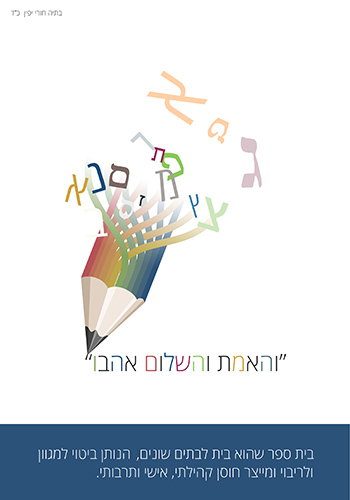
Truth and Peace will be Reconciled
A school that is home to different homes, giving expression to diversity and multiplicity, and fostering communal, individual, and cultural resilience.
Batya Houri Yafin is an educator and a teacher. In recent years she has taught Bible and Talmud at the Leyada high school in Jerusalem, where she has also coordinated social and pedagogical activities, and served as a member of the school’s pedagogical development team. In parallel, Batya has for many years been a volunteer in the “Street Address” program for at-risk youth, run by the Elem nonprofit. She directed a study program for Israeli singers interested in learning about traditional Jewish liturgical songs (“piyut”) from an artistic and intellectual aspect, called “Friend, did you Forget?!” Batya completed a bachelor’s and a master’s degree in Jewish philosophy, along with a teaching diploma, at the Hebrew University of Jerusalem, in the Revivim honors program for Jewish education teachers. She is interested in deepening the conversation between different sections of Israeli society, and enriching their shared language.
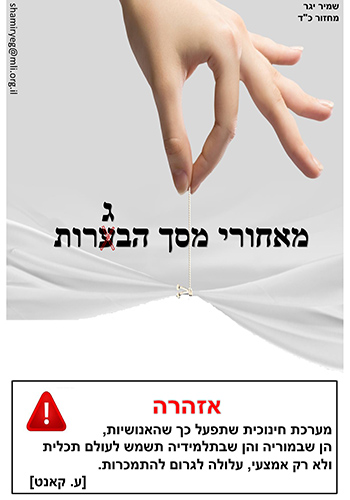
Behind the Veil of Matriculation
Shamir Yeger is an educator, researcher, and entrepreneur. From 2013 to 2015 he taught at the school of education at the Hebrew University of Jerusalem, and founded the “Israel Competition for Young Historians” – an initiative to encourage the study of research supported by the Zalman Shazar Center, the Ministry of Education, and the European EUSTORY network. Previously he was a founding faculty member of the Hevruta school, where along with his roles as teacher and head of humanities he also engaged in developing unique programs. Shamir holds a bachelor’s degree in general history and philosophy, and a master’s degree in general history, both from the University of Haifa. His doctoral thesis at the Hebrew University of Jerusalem is on the education system of the Third Reich. He is interested in promoting the technological/professional education system, in strengthening the connections between academia and schools, and in the development of pedagogy relevant to a changing reality.
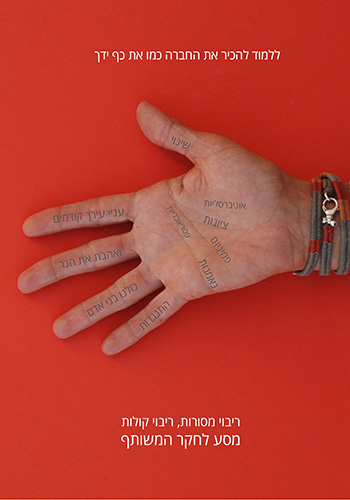
Getting to Know Society like the Back of Your Hand
Multiple traditions, multiple voices; an exploration of what we have in common.
Anat Yona Amedey has held a variety of management and coordination positions in social change organizations, including Shatil, the Alliance Israelite Universelle, and the Hebrew University of Jerusalem’s Unit for Social Involvement. She has developed and written educational programs on social justice, education, and leadership for Mimizrach Shemesh, a Jewish study center dedicated to social leadership, and was co-moderator of the “Tidrashi” study program. Most recently, she developed and ran the “Making Changes” program to foster initiatives to improve the status of women in religious and traditional society. As part of her work she created a range of interactions and networking activities among female activists working to make women’s voices heard in the religious bureaucracy. Anat holds a bachelor’s degree from the joint degree program at the Hebrew University of Jerusalem in philosophy, political science, and economics, and a master’s degree in political science from the same institution. She is interested in furthering social change inspired by Jewish tradition and by Oriental Jewish heritage.
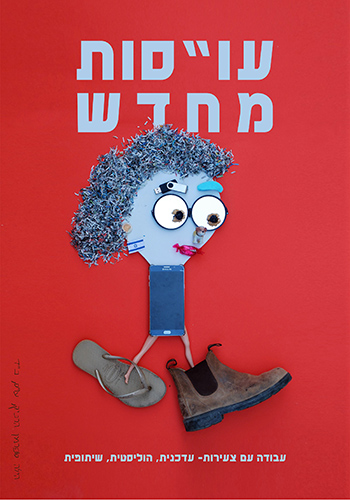
Social Re-Workers
Holistic, cutting-edge, collaborative work with young women.
Hilla Soferman Harnik is a social worker. She directed and led the founding of the Girls and Young Women Area in the “Bat Ami” organization, working to integrate young women from at-risk and deprived backgrounds into national service frameworks, both civilian and military. Hilla treated young people in extreme circumstances and in severe risk situations, and developed programs for girls and women in crisis. Via the Forum of Organizations for At-Risk Girls she helped lead efforts to promote the rights of girls and young women, and to create models for housing solutions. Hilla holds a bachelor’s degree in social work from the Hebrew University of Jerusalem, and a master’s degree in group moderation from Tel-Aviv University. She is interested in developing unique, tailored responses for girls and young women in crisis situations, based on critical feminist theory.
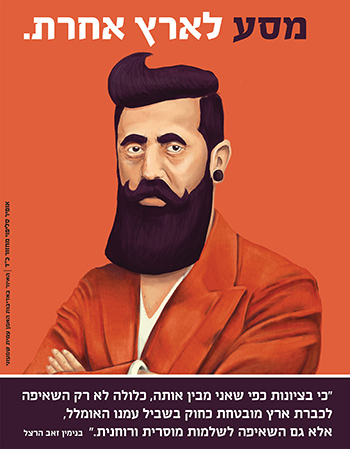
Journey to another Country
From 2010 to 2015 Ofir Slipoy served as the director of the education division of the Israel Scouts movement and as the organization’s deputy director-general. As such he was responsible for the educational activities of 80,000 scouts, including programs for the inclusion of children with special needs, new immigrant children and children of immigrant families, and at-risk youths. Ofir led many educational processes during his term, including the writing of a new educational program for the movement on the issue of Jewish-Israeli identity, and developing a program to address juvenile drinking. Ofir has also served as an emissary to the United States on behalf of the Israel Scouts and the Jewish Agency for Israel. Ofir holds a bachelor’s degree in behavioral science, management, and economics, and a master’s degree in non-profit management, both from the Ben-Gurion University of the Negev. He also holds a diploma in group moderation from the University of Haifa. Ofir is interested in the application of experiential, values-based education in formal education settings.
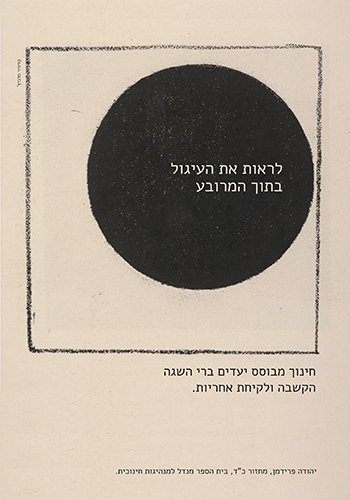
Seeing the Circle inside the Square
Education based on attainable goals, listening, and taking responsibility.
Yehuda Fridman directed a center for academic excellence at the “Educating for Excellence” nonprofit, and established the high school center for excellence in Netanya. As part of his role he helped outstanding students from low socioeconomic backgrounds to fulfil their potential and attain high academic achievements, and launched and led a project to introduce students to social content in different places throughout Israel. In recent years Yehuda has volunteered for the “House of Wheels” nonprofit, coaching and mentoring paraplegic youth. He holds a bachelor’s degree in communications and politics from the Open University, and a master’s degree in education management, with a specialization in informal education, from Bar-Ilan University. He is interested in the issue of at-risk youth in Israel.
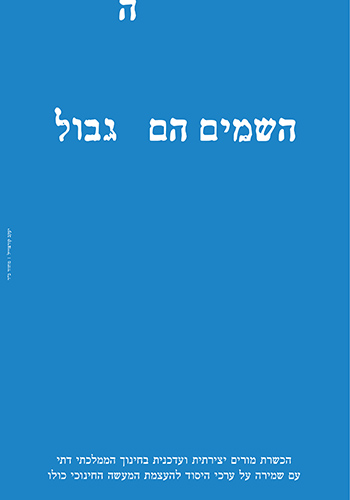
Is the Sky our Limit?
Creative and contemporary teacher training in state-religious education; maintaining fundamental values that strengthen educational practice as a whole.
Yaacov Kortzvailn is an educator who served as the academic coordinator of the Hemdat Hadarom Academic College of Education. He has helped develop the boys’ track at the college since its inception, and as part of his role was responsible for training teachers from the Haredi (ultra-Orthodox) sector in core educational subjects. Yaacov studied for ten years at the Maaleh Adumim national religious seminary, and from 2005 to 2015 taught Talmud and Jewish philosophy at the Lev Lada’at national religious seminary in Sderot. He holds a bachelor’s degree and teaching diploma in Bible and Jewish law, and a master’s degree and PhD in Jewish philosophy, all from the Ben-Gurion University of the Negev. His doctoral thesis examines the religious philosophy of Rav Kook, and the way in which his writings were edited by his students. Yaacov is interested in developing Israel’s teaching colleges and in improving teacher training.

Define: Social
Added Value: Sustainability
Sigalit Rachman is a professional in the field of sustainability and environment. For many years she worked at the Ministry for Environmental Protection, developing the ministry’s frameworks for action in local authority and community settings. She also worked to develop the areas of urban environment, local sustainability, and local government. Subsequently she directed the Jerusalem branch of the Society for the Protection of Nature in Israel, in which role she led activities and new projects in the fields of active nature protection, education in the Haredi (ultra-Orthodox) and Arab sectors, urban nature, and urban site preservation. Sigalit is a participant in various environment and sustainability projects in Israel and abroad, and is the chair of the board of directors of the Movement for Israeli Urbanism. She holds a bachelor’s degree in international relations and geography, and a master’s degree in environmental policy from the faculty of geography, both from the Hebrew University of Jerusalem. Sigalit is interested in promoting education towards sustainability and communitarianism, in particular in the formal education system.
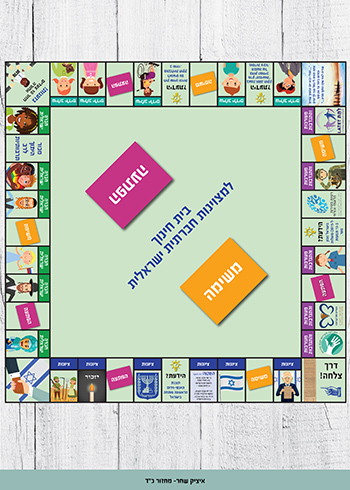
An Education Center for Israeli Social Excellence
Itsik Shachar served in the IDF for many years, commanding various Artillery Corps field units at the battalion and brigade levels, and eventually commanding the School for Field Artillery in Shivta. In his final position he served as head of the Doctrine, Instruction and Training Division of the IDF GOC Army Headquarters, in which role he worked on strategies for the continued development of IDF ground forces, prepared warfare doctrines, and developed training policies using innovative implementation methods. Itsik holds a bachelor’s degree in law from the Herzliya Interdisciplinary Center, and a master’s degree in education administration and leadership from Tel Aviv University. He is interested in strengthening weakened population groups and integrating them in the education system, and in the aspiration toward personal and social excellence.
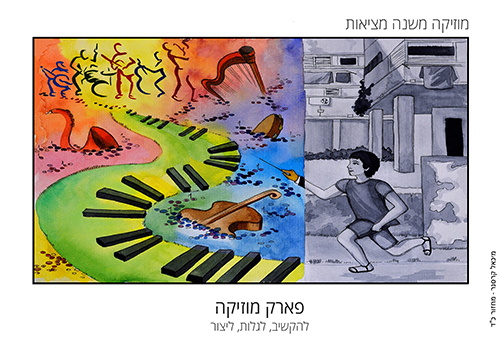
Music Changes Reality
A musical park: listen, discover, create
Michael Krasner is a musician and educator. Most recently, he directed the music studies at the musical yeshiva (religious) high school “David’s Harp”, belonging to the Bnei Akiva religious school network. In cooperation with the Mateh Binyamin regional council he established the “Binyamin Players” program for teaching music in small groups in school settings, which gave more than a thousand children the opportunity to play instruments for the first time. In his role as a musical consultant Michael developed a unique spiral model for exploring music for grades 3 through 6. He also built a website that supports musical exploration, containing a large quantity of musical information. Michael holds a bachelor’s degree in jazz saxophone from the Jerusalem Academy of Music and Dance, and a master’s degree in music education from Levinsky College of Education. He is interested in expanding musical education and in making music accessible to all students.

Defining the Core Values of the State Education System
Assael Sharir is an educator, musician, and entrepreneur. In his most recent position, he was director of the central region for the “Education for Excellence” nonprofit, and was a member of the organization’s management team. He launched educational programs, led the opening of new centers of activity, and took an active part in forming the organization’s educational agenda. Assael has directed the youth and community unit of a regional council, run discussion groups for parents and teachers, set up and led youth delegations abroad, and produced community events and musical performances. He holds bachelor’s and master’s degrees in music from the Jerusalem Academy of Music and Dance, as well as a master’s degree in management of educational systems. He is an active flautist. Assael is interested in the development of scientific research as the basis for the design of future education systems.